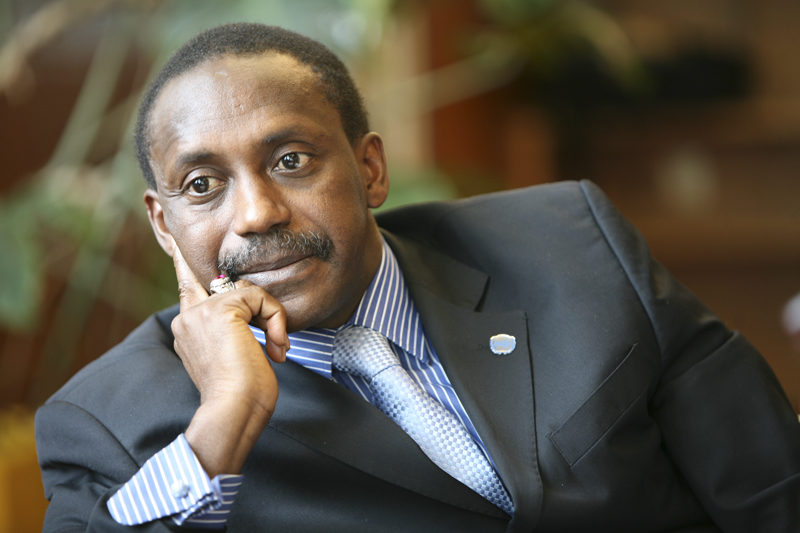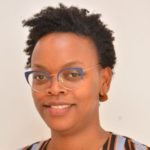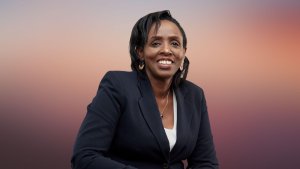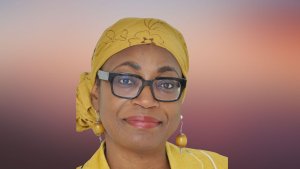As you are the member of Parliament for Kambia in the northwest of Sierra Leone, tell us how this part of the country has been hit by the COVID pandemic and how it has managed to cope over the last 12 months.
When COVID started we were really scared in the northwest, in Kambia and its region. The fact is that our neighbour, Guinea, and its capital Conakry had large COVID numbers even before we had the first case in Sierra Leone. We were concerned for two reasons. Kambia is one of the closest points to Guinea and is only 2-3 hours from Conakry. It’s the main crossing point between Sierra Leone and Guinea. So, our proximity to Guinea scared the hell out of us. Second, we remembered our bad Ebola experience which we inherited from Guinea, which made us panic further.
As Member of Parliament for the Kambia region, I and my MP colleagues started quickly with a programme of sensitization, even before the first case was logged in Sierra Leone. My constituency, in particular, is very porous. We have over 40 crossing points into Guinea and a lot of them are no more than bush paths. We had to set up youth groups to help control the crossing points and, despite the worry, we did not actually get large numbers of infections. Somehow those initial measures counted, helped by the fact that Sierra Leone closed the borders.
To deal with the large number of illegal crossing points, we mobilised quickly the military and police, and organised trips with them to go to the different crossing points. I sensitised villages and chiefs along the length of the border, so they became aware of the problem. And the military on both sides were very vigilant. In spite of those scares, our numbers stayed relatively low, and they remain low. We don’t know how to explain this - perhaps that early sensitization work, the handwashing, plus the social distancing. The Ebola experience probably made people a little bit more compliant with instructions and regulations from government. Kambia had a curfew imposed long before any other place in the country, from 6pm in the evening till 7am in the morning. This stayed in place for quite a long time, so much so that some of my constituents were complaining and asking for it to be lifted. But we didn’t allow it because we were watching the numbers in Conakry, which were really high in comparison with Sierra Leone.
On the health front we have fared relatively well so far, but the economic impacts have been more serious because of the lockdown. Farming was affected and we will have to wait to see the survey numbers to see how badly farming has been hit. There is no doubt the lockdown brought hard times. We have the largest international market in the country in Kambia, which attracts traders from Guinea, Senegal, Mali, Burkina Faso, and Liberia. This market which they call Barmoi Luma. Luma means “community market” in my home language. On a good day we estimate more than 20,000 people come and mingle. There are huge trucks from Mali and Senegal buying our produce. People still do barter trade of commodities. Shutting the border and restrictions on movement badly affected people there in terms of jobs and incomes.
It is mainly an agricultural area growing rice and because there is a very long coastline, there is a lot of fishing too. My constituency has 67,000 people and Kambia District as a whole 350,000 residents. While we rely a lot on fish for food and proteins, there are also groundnuts, maize, cashew, cassava - the second main staple - and palm oil. Vegetables matter too, and we grow a lot of peppers and aubergine. These vegetables find their way to Conakry, which some people estimate may have as many as 3.5 or 4 million people, so it’s a really big market, almost 50% of Sierra Leone’s total population and we’re close by. As a result, a lot of what we grow, most of all our rice, fish and palm oil goes to Conakry.
What is the situation in Sierra Leone with vaccine availability? And are people willing to be vaccinated or it there a lot of hesitancy?
There is both hesitancy and denial as regards COVID and the vaccine, because our numbers are so low. A recent US travel advisory note put us amongst the four lowest worldwide in terms of prevalence. A lot of people in my constituency don’t believe COVID is real. They also joke that it is a “white man’s problem” and it cannot affect them. So there is denial that COVID even exists. I myself also wanted to wait a few months until the vaccines were proven. I finally got my first vaccine this week. Rollout started three months ago, and it is only now I have chosen to have the vaccination. Look at me - I am well-educated, well-aware of the trade-offs and have good information. I was certainly a bit hesitant. I am not sure about the absolute numbers but all of the vaccine we have here came in through COVAX, the initiative of the World Health Organisation. We got AstraZeneca through this channel, then the Chinese brought their own vaccine in, and we then got a second lot of AstraZeneca from COVAX. The President and the Ministers did well to take it at State House, in a televised ceremony. Some of us sceptics did not show up. The rollout has been smooth because the numbers of people volunteering for injections are few so far. They have done a reasonably good job in putting supplies in each of the main district headquarters. Even Kambia has its share. While it has been a small amount to start with, we’ll need a lot more now.
Part of what pushed me to take mine, as a member of the elite, is because people like me have now become scared of the Indian (or Delta) variant. They had been saying our hot climate protects us from COVID. But the experience of India and Brazil kills the myth about hot weather. It has been fear of the Indian variant that scared us to go and get it done. Second, is the worry that we will be faced with the need to get a vaccine passport for travel, and this made some of us realise we need to get vaccinated now. I have friends who say “hey, if I don’t get it now, I may not be able to travel for business or other reasons to Europe, US or Asia”. The roll out is going well but we need a lot more. We’ve had a miniscule supply, and there are also concerns about cold-storage. When I took mine, I had two days of fever but nothing really serious, and the third day, it cleared, and I now feel fine and well. But there has been fear about proper storage. And that links to the energy system, as we have power outages for as many as 6 hours a day. There is a big worry about efficacy of the vaccine if the storage system is not good.
You mention energy which has been at the centre of your work over the last 15 years. Has the COVID crisis made you re-think your focus on energy?
The COVID crisis has given even more impetus to all of the energy-related issues that I have been advocating over the last nearly two decades. Fifteen years ago, we had one of the highest maternal mortality rates in the world, and the highest infant mortality rate in the world. My cousin who was doing a survey for DFID ten years ago showed that much of this was due to lack of electric power in some of the clinics, while a lot of deliveries were done at night without electric light - they use candlelight. When COVID hit, you could immediately see the potential link between sickness and vaccine cold-chains, powered by grid electricity or renewable energy, to keep temperatures sub-zero. We’ve been telling the world for the last two decades that energy is critical to achieving all the other SDGs, especially health service delivery. The COVID pandemic has, if anything, inspired me further. I did an article in February arguing that effective vaccine delivery was closely tied to the availability of renewable energy, because I cannot see how they will store the vaccines in my village without solar power. And because it came out just after the US President’s inauguration, I said “President Biden, this could be your new foreign policy. If you want to democratise vaccine distribution, you also need to drive the spread of renewable energy to all corners, all communities.”
How has the rollout of investment in energy been affected by the COVID crisis and associated economic downturn?
The COVID pandemic has had several impacts on the energy sector. The first impact, even before any cases actually hit Africa, was an immediate drop in demand for oil and gas. So those countries, like Nigeria, Angola and others, were immediately hit, in the first few weeks of COVID appearing in Asia, Europe and America. Demand immediately dropped which also then affected related investments in prospecting and expansion of the oil and gas industry. Second was lowering of the demand for electricity, especially in the more industrialised African countries. Factories shut when there is a lock down. Third was the inability of consumers to pay their bills. In neighbouring Guinea, the president offered to pay people’s utility bills because lockdown meant people did not have any money. We did not do that in Sierra Leone, but a number of other countries considered that measure. Lockdown has badly hit utility companies. Investments have also not been coming in. The International Energy Agency estimated already by January or February this year that there had been a 30% drop in energy investments in Africa, and this is for a continent with the lowest rate of access to energy already in the world. As a result, you can imagine how these multiple factors have impacted the energy sector. We hope things may improve in the post-COVID period. We hope that governments in Africa and elsewhere can understand the critical nexus between access to energy and social service delivery - clean water and health services – as well as food and agriculture. We hope it has made them understand the connections. But there is another bigger problem. 85% of people in sub-Saharan Africa (outside South Africa) rely on charcoal and fuelwood for cooking, which is causing household air pollution and pulmonary problems. We worry that underlying pulmonary problems for women, children and men as well could make them more vulnerable to another wave of COVID. The WHO has been doing studies in India and elsewhere to see if there is any correlation between air pollution in general and COVID susceptibility. We’ll see what comes out in the next few months and from household studies in Africa.
How might you get more investment, both domestic and foreign, coming into energy generation and distribution?
In my own country, and others I know well, corruption is very high. Energy sector governance has to be re-vamped. That’s a big catch-all phrase which covers many things, like honesty around running the power utility well. This includes revenue collection, billing processes, and pay as you go - digitalisation could help all of these as it did for mobile phones. Regulations and public policy all have to be consistent, predictable and long term. The government has to have commitment to longer term solutions, instead of relying on a “fire-brigade quick fix”. My country is so guilty of quick fixes - we’re still relying on emergency power provided by Turkey’s Karpowership. which the government party criticised when in opposition, but they’ve done just the same. They’ve extended the contract. As a result, we’re going to have emergency power supply in Freetown for ten years. But if you look at those last ten years, Rwanda more than doubled access to electricity in that time, because they were focused on long term solutions. The energy sector is so corrupt, you need to go in for brutal governance reforms to bring effectiveness and transparency into the sector. Successive governments want to do quick fixes and make money under the table. We must have sector governance reform - if you fix it, there is predictability and maybe some companies will come and partner with you.
Second, we need to get the utilities to perform. They are such big gatekeepers in the system that when they are corrupt and inefficient, they mess up everything else in the energy sector. Third, we must find ways to support the regulators, many of whom are new in sub-Saharan Africa. Many have been operating for less than ten years, so they’re still trying to learn their role as regulators. The “unbundling process” for energy supply is recent and not complete in a number of African counties. Another critical factor is proper planning. A number of us are advocating for an integrated energy planning framework. This is an idea we have been pursuing in the Global Commission to End Energy Poverty launched by the Rockefeller Foundation, African Development Bank and MIT. A number of us from Africa are part of this Commission and promoting the idea of a good energy framework for planning the integration of energy systems across several dimensions. For example, make sure that when you plan for on-grid, you plan for off-grid too, including mini-grids. Good geo-spatial mapping is a big help, so that potential investors can come in and see, for example, that they can deliver to the whole northern region. Population densities are known, and income levels are known, so the investor would not need to do detailed background research himself.
Integration is also critical for developing other sectors properly. If we’re going to do sector-coupling, which is so essential for a country like mine which relies on minerals. When we design mining policy for a country like mine, let the Energy Minister be part of the negotiations and consider how those mining companies can become anchored centres for energy demand, or potential private sector power producers. Because every mining company which comes to Sierra Leone also builds their own power-generating plant. But with good planning, they could be part of a private company’s energy supply under a guaranteed Power Purchase Agreement (PPA), and meanwhile they can also supply the community. Maybe out of corporate social responsibility they could even cross-subsidise energy access for the communities around the mining site. So, we need integrated public policy for energy and mines, energy and health which we were discussing earlier, and strategic planning for energy utilities so that they think about the likely future demand from using electricity for cooking, as an additional demand centre.
Finally, one of the neglected areas which we have tried to document in the Global Commission to End Energy Poverty and the work I did two years ago for the European Commission is the lack of investment in distribution systems. We have that situation here in Sierra Leone. The president made a speech a few weeks ago in which he stated that, under his administration, over the last three years he has increased significantly the availability of electricity in the capital. Even in the well of parliament, we all started laughing. Why? We have more power outages today than we had a month ago, or 6 months ago. He went on to explain that the reason there have been problems is that we inherited an antiquated distribution network. In the reports we have been doing, we say let’s find ways to bring investment into independent power producers, and its probably also time we develop business models for independent distribution providers. Some countries are making big investments in power generation, but the transformers and the power lines are not there. The interconnections between our cities do not exist. In Sierra Leone we have one of the worst inter-district connections – in fact we only have 3 lines - in a country where you have 14 districts, each of which has its own independent connection. Distribution has been a neglected area for a long time. And of course, finally, finance matters. Getting more investment in, de-risking these investments using ODA, all of that depends on good sector governance.
Foreign direct investment is one obvious source of capital for energy. But what about domestic sources of capital? How can you tap into these?
We need to strengthen the capacity of local banks to invest in the energy sector. I can speak for my own country - we don’t have banks able to support energy investment, whether its renewables, mini-grids or whatever. Maybe its different in some of the biggest economies like Nigeria. Capacity building and seed financing are needed. Let’s put this in context. When the Iron Curtain fell, the European Investment Bank had to train bankers in eastern Europe how to structure deals and energy efficiency projects. That’s how they grew that market. When I was leading SE4ALL, I was with EBRD and they would tell stories about the first few banks they were training in eastern Europe to retrofit people’s apartments, and also start financing industrial energy efficiency measures. After a few years other banks came into the market. And it’s a $40b market now. A group of funders had to invest in capacity building - KFW, EBRD and EIB - it took time to help make those markets grow. It’s the same in Africa. We need to help build capital markets with deep pockets that are able to take the risks to expand power production, and power trade.
One issue which I need to mention is encouraging power trade. Some of our countries are too small to bring in big investments in power generation. Twelve years ago, I was talking to a rich European investor, who had major assets in North Africa and Asia. We met at an event and I said “hey my president is looking for people to invest in 50MW of energy generation”. And he said “Mr Yumkella, 50MW may be big for your country and your president but that’s not big enough for me to open an office.” He was thinking 500MW or even 1GW – that scale would give him grounds to open an office. And preferably in a place like Cote d’Ivoire with good internet and power connections which allow you to trade power, as also happens a lot in Europe. A number of us are advocating for power trade, and my country is building its first interconnection backbone due to be operational at the end of this year. But that deal took seven years to negotiate. It took another 3 years to set up the company that will run it and provide power between Sierra Leone, Guinea, Liberia and Cote d’Ivoire. But with this kind of experience, we now believe we can negotiate these deals in 3 years not 7. And companies then know that instead of supplying Sierra Leone, you’ll be supplying 45 million people. The AfCFTA would certainly help with this. There is also a recent study by the Tony Blair Institute and PowerAfrica which shows how much money each country could save if they had good interconnections and energy trading through the power pool. The AfCFTA would certainly make the trade easier and we’re advocating for this with Power Africa.
You were formerly DG at UNIDO before SE4ALL, with a particular focus on industrialisation. How does the industrialisation debate look for Africa today? Has the COVID pandemic changed the strategy?
I have made the case for 25 years that Africa has no choice but to industrialise otherwise we’re doomed to be poor for another 50 or 100 years. This is a major reason why I went into the energy space. We were on a call with Secretary Ernest Moniz – Obama’s secretary for Energy - with the Global Commission and he made the case for why there is a strong nexus between energy and industrialisation in Africa. We cannot talk about energy transition in a utopian sense as if Africans will suddenly jump into solar. Many people don’t want to talk about using gas for power, but it’s an injustice for Africa. Moniz and I were on the same page as we both argue that gas is an important transition fuel to enable Africa’s industrialisation ambitions but also enable greater deployment of renewables. In many cases, it’s not just about energy transition, it’s about energy access. My country has 15-20% energy access, so we should certainly look for gas to power solutions. The government here is looking at gas – both liquid natural gas, and liquid petroleum gas - how can anyone tell us not to do that? The bigger context is that Africa’s emissions represent 2% of the global total so if you start to talk about carbon budgets, as will be the discussion at COP26, let’s remember in Africa we’re only using 4% of the global total. So this means that Africa should have some degrees of freedom to use fossil fuel technologies to save lives and power our economy. We’ll make very little impact even if we do use gas. Industrialisation is key. COVID has made us realise even more the importance of this. It has also made us think about the manufacturing of drugs. In our parliament debate is going on about a convention we’re supposed to ratify about harmonising standards across Africa for drugs. As leader of UNIDO, I certainly invested a lot of time on this topic, supported by the Germans above all. At that time, we were supporting generic drugs production for HIV medicines. Industrialisation is a must. The context is even more difficult now – some estimate Africa must generate 20 million jobs per year, in my country youth unemployment is 60%, which everywhere is a very big timebomb, which will hit and destabilise us. John Kerry used to talk about this a few years ago, when he was secretary of state. The youth bulge in Africa is scary. And unless we focus on industrialisation, diversification and digitalisation, I see instability accelerating across a lot of countries. And when you look at more and more draconian governance systems across Africa, I think part of it is fear of the youth. The youth will revolt. I just pray that some of us don’t become collateral damage. I spoke about this back in 2008 at the African Union. I told them then that youth are angry, in a very angry undiplomatic speech. Kenya had just had the post-election riots in which they’d massacred almost 1,000 people. That day Ghaddafi had moved to suspend discussion of industrialisation, despite the fact that we had prepared for months. Luckily, other African leaders backed the industrialisation debate.
How do you see the role of countries outside Africa in this industrialisation process? Some people say China is the best model, others go for the US, or for Europe? Who can be the best partner?
Africa needs all partners. We need to be smart and eclectic, picking what works for us depending on time and context. We need all markets – Chinese, European, American. We want to sell and be part of global value chains, picking our niches of course. One of my friends is Paul Collier and together we have been advising the Lagos Business School Forum. We went back to look at some of the work Paul did for me when I was at UNIDO. The industrialisation we need now is not to produce entire products but to be part of a value chain where you do one bit of a larger chain. There was a big splash when we launched that study. Paul had just produced the book “The Bottom Billion” and we produced some case studies which included one village in China that produces 75% of the buttons that they use in garments in the rest of the world. So don’t think you have to produce the whole jacket, just buttons and labels. They were so good at it, Italians started dismantling their own factories and bringing them to that one location. Africans should look at niche markets producing specialised components that others will buy. Rather than just selling commodities. Our industrialisation has to be by making ourselves relevant in certain value chains and this will vary by geography. It depends on which country, on your human capital, on your natural resources.
If we go back to energy now, Africans should ride the green wave and become producers of components within some technology value chains. We’re sitting on 40-50% of the world’s cobalt plus manganese, both of which are needed for batteries. South Africa has 70% of the world’s platinum group of metals which are needed for fuel cells. All of these metals plus rare earths are critical for the world’s transition to clean energy. In short, some of the key metals we need for driving a clean energy revolution, say in hydrogen, are sitting in Africa. If we’re talking about a just and fair transition as is being proposed for COP26, it has to consider Africa’s ability to supply many of the key metals needed for the green energy revolution. Whether it is battery storage systems, solar panels, wind turbines or other components. We need to be part of the first and second stage in refining and processing metals, such as coltan, zircon and tantalum. It would be unjust if, with this new green revolution, Africa is left out, or used merely as a source of raw materials. It’s not a conspiracy to leave us out but more a question of whether we Africans are ambitious enough to ride this green wave and capture market share. We don’t want to be left behind.
About the COVID-19 and Africa series: a series of conversations conducted by Dr. Folashadé Soulé and Dr. Camilla Toulmin with African/Africa-based economists and experts about their perspectives on economic transformation and how the COVID situation re-shapes the options and pathways for Africa’s development - in support of INET’s Commission on Global Economic Transformation (CGET)








